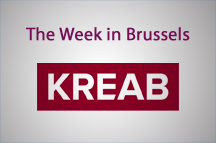 Should the EU end roaming charges once and for all? How should net neutrality be regulated in the EU? These questions have been heavily debated in the context of the Telecom Single Market (TSM) Regulation in the last year and a half and the reactions to the EU member states’ position this week make it clear: EU institutions and stakeholders have yet to find a common answer.
Should the EU end roaming charges once and for all? How should net neutrality be regulated in the EU? These questions have been heavily debated in the context of the Telecom Single Market (TSM) Regulation in the last year and a half and the reactions to the EU member states’ position this week make it clear: EU institutions and stakeholders have yet to find a common answer.
Former Commissioner Neelie Kroes presented an ambitious proposal to unify the EU telecom market in 2013. Aside from abolishing roaming and protecting net neutrality, the reform would lead to a coordinated spectrum infrastructure, a single EU-wide license for telecom operators, and harmonised consumer rights.
Support from winners and losers from roaming
 Such level of ambition is not fully visible in the member states’ positions that were approved this week. The Latvian Presidency skillfully steered the political reality to a joint position by getting both alleged winners and losers from the end of roaming to accept an alternative solution. In this narrative, the winners would be countries whose citizens tend to travel a lot, whereas the losers would be countries receiving many visitors.
Such level of ambition is not fully visible in the member states’ positions that were approved this week. The Latvian Presidency skillfully steered the political reality to a joint position by getting both alleged winners and losers from the end of roaming to accept an alternative solution. In this narrative, the winners would be countries whose citizens tend to travel a lot, whereas the losers would be countries receiving many visitors.
If member states get their say in negotiations with the European Parliament, some roaming charges for mobile phone usage will continue to apply. Telecom providers would have to offer customers with a ‘basic roaming allowance’, capping the amount of phone calls, SMS messages and data that a customer could consume without a surcharge. Once this level is exhausted, usual roaming charges would apply. The size of this allowance must be set in negotiations with the Parliament.
The Latvian Presidency also found a compromise on net neutrality. The rules in the joint position guarantee the principle for typical consumers, but also allow telecom providers to offer better quality services for so-called ‘specialised services’ with specific needs.
The next challenge: win over the EP
 With the internal battle fought, the Latvian Presidency now move on to the challenge of working out a compromise with the Parliament, for the difference between the institutions is large: the Parliament’s position from April 2014 proposes to abolish roaming charges as soon as late 2015 and has a stricter protection of net neutrality. Furthermore, MEPs across political groups are exceptionally united in their strong position. Over 120 MEPs from all political groups co-signed a letter to urge the Council to adopt a more ambitious position. This high level of unity sends a clear message: the Parliament will not easily accept the Council’s views when the final negotiations start.
With the internal battle fought, the Latvian Presidency now move on to the challenge of working out a compromise with the Parliament, for the difference between the institutions is large: the Parliament’s position from April 2014 proposes to abolish roaming charges as soon as late 2015 and has a stricter protection of net neutrality. Furthermore, MEPs across political groups are exceptionally united in their strong position. Over 120 MEPs from all political groups co-signed a letter to urge the Council to adopt a more ambitious position. This high level of unity sends a clear message: the Parliament will not easily accept the Council’s views when the final negotiations start.
If we may interpret the signs, the definite answer of how the EU will regulate roaming and net neutrality will be up for discussion a couple of more months.












